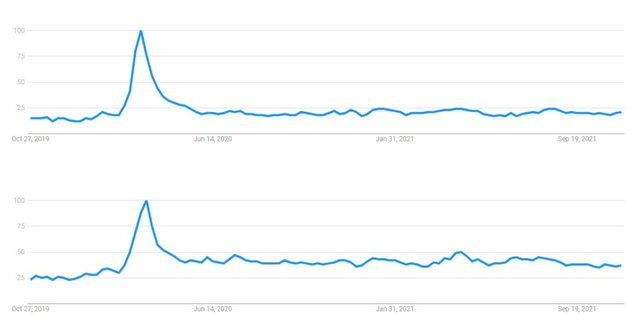The Corona virus pandemic has had a substantial influence on the lifestyle of many of us. The question is if and how these changes will be persistent, and we will return to a ‘new normal’, or if we return to the ‘old normal’. A search in Google Trends shows us that, not surprising, there was a surge in searches on ‘flu’, ‘immune’, ‘respiratory infection’ etc. in March 2020 (Figure). This correlates with a sharp increase in searches on ‘vitamin C’ (Figure), ‘vitamin D’, ‘zinc’ and to a lesser extent ‘curcumin’, but not for e.g. vitamin A, B or E. Neither did components such as probiotics or omega-3 enjoy an increase in google searches. Searches for vitamin D and C and zinc have since March 2019 declined, but not to their pre-pandemic levels and remain up to twice as high as before.

Figure. Google searches for ’immune’ (top) and for vitamin c (bottom).
What can we learn from this? Obviously, the consumer understands that supporting the immune system may be relevant in relation to Covid-19. We also see that the consumer pursues this immune support through a very limited number of components; the ‘usual suspects’ and that this interest remains at least at a somewhat increased level up to now.
The question is if that has changed purchasing behavior? Multivitamins have shown a continuous growth in the past 20 years. The pandemic seems to have caused at least a transient further increase in purchases. Interestingly, also other supplements such as probiotics have seen an increased interest; despite that they were not searched more in Google. This can potentially be explained by the observation that there has been a dramatic increase in product reviews for probiotics. Interestingly these reviews are on many diverse health endpoints such a weight management which are not immune or Covid related. The suggestion is that the pandemic has made the consumer more generally health conscious.
Another change is the place where consumers purchase their dietary supplements. This has shifted from the physical shops such as supermarkets and health stores to on-line shops. This change has particularly happened in the US.
What may this mean for the future; will the consumer retain an increased interest in dietary supplements? Sooner or later, we will learn to live with the corona virus; be it through vaccines, medication or that people have been infected with the virus. As I have written here before, taking care of one’s health was never a bad idea. This will still be true in the future as well; other health conditions are not disappearing. Here, the increased health awareness the pandemic has generated with the consumer may play a role and potentially maintain an interest in dietary supplements and functional foods.
Further, clinical trial registries show there are many studies planned and under way assessing the potential benefits of probiotics, all vitamins; not only C and D, zinc, omega-3, etc. on Covid related outcomes. When these studies are completed and communicated about, any positive results may help keep up the momentum of dietary supplements also in the future.
Over all, it appears that dietary supplements have been doing well during the pandemic, with increased health awareness, purchases and scientific activity. This may continue. However, as always, “prediction is very difficult, especially if it’s about the future” (Niels Bohr).







